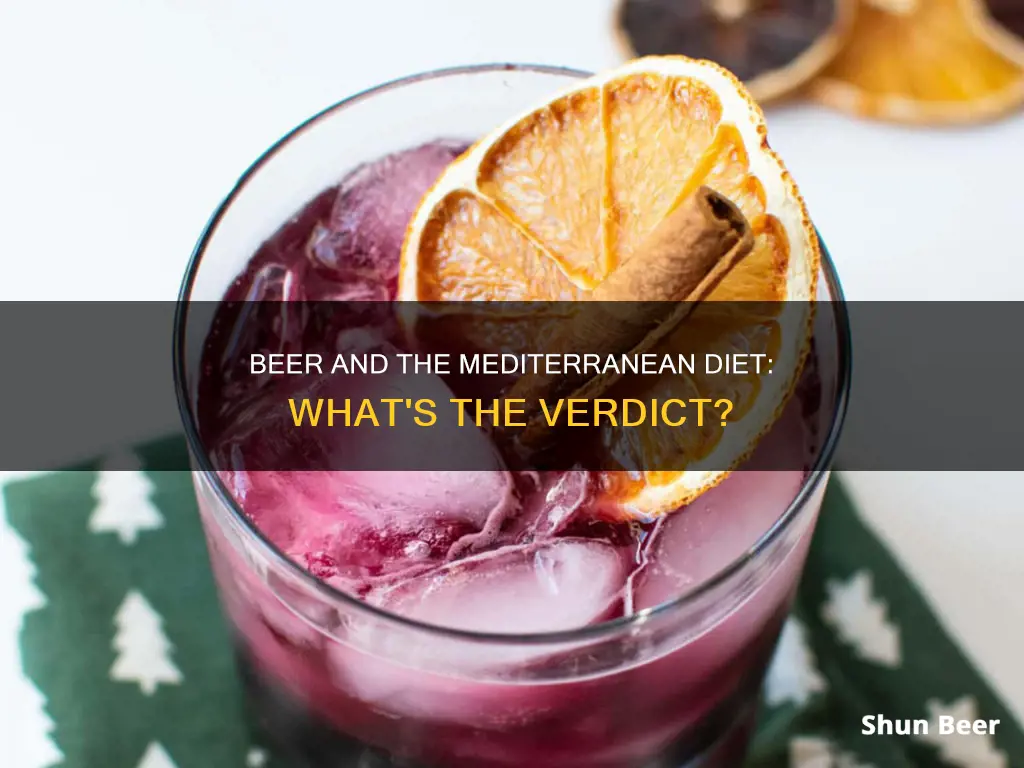
The Mediterranean diet is highly effective for good health and is especially useful in reducing the risk of cardiovascular disease. It involves eating lots of vegetables, legumes, nuts, fruits, cereals, and fish, as well as healthy unsaturated fats like olive oil, while consuming minimal amounts of red meat, poultry, and full-fat dairy. Alcohol is also a component of the Mediterranean diet, with moderate drinking being good for health. Beer, wine, and liquor are all included in the Mediterranean diet, with drinking patterns that involve moderate alcohol intake spread out over the week, a preference for red wine with meals, and an avoidance of binge drinking.
What You'll Learn
- Beer, wine, and liquor are all allowed in moderation
- Alcohol is linked to lower rates of cardiovascular disease
- Drinking alcohol with food is the typical pattern in Mediterranean countries
- The Mediterranean diet encourages turning mealtime into quality time
- Overall mortality rates are lower among moderate drinkers than abstainers

Beer, wine, and liquor are all allowed in moderation
The Mediterranean diet is renowned for its health benefits, particularly in reducing the risk of cardiovascular disease. Interestingly, alcohol consumption, when enjoyed responsibly, is considered an important component of this diet and contributes to a healthy lifestyle. Alcohol, especially in moderate amounts, has been linked to a reduced risk of cardiovascular issues and even improved heart health.
The Mediterranean diet includes plenty of fruits, vegetables, whole grains, nuts, legumes, and fish, as well as healthy unsaturated fats like olive oil. This diet typically includes one to two drinks per day. While alcohol consumption has been associated with an increased risk of certain cancers, the Mediterranean diet's protective substances may help counteract these harmful effects. For example, extra virgin olive oil, a staple of the Mediterranean diet, contains anti-oestrogens that block the carcinogenic actions of oestrogens, thus reducing the risk of breast cancer.
The way alcohol is consumed is also important. In Mediterranean countries, drinking is often accompanied by food, which slows the absorption of alcohol and limits dangerous spikes in blood alcohol levels. This cultural aspect of drinking during mealtimes or with a few small bites is an integral part of the Mediterranean lifestyle and sets it apart from binge drinking cultures.
So, if you're following the Mediterranean diet, you can certainly include beer, wine, or liquor in moderation. However, it's always important to be mindful of your overall health and consumption patterns, as excessive drinking can have detrimental effects.
Parking Lot Beer: Is It Legal to Drink?
You may want to see also

Alcohol is linked to lower rates of cardiovascular disease
Alcohol, when consumed responsibly, is linked to lower rates of cardiovascular disease. The Mediterranean diet, which is highly effective for good health, includes one to two drinks per day. Moderate alcohol consumption, defined as up to two drinks per day for men and one per day for women, is associated with reduced mortality and a lower risk of heart and circulatory diseases.
The Mediterranean diet typically includes red wine, but all types of alcohol, including beer, can be beneficial for heart health when consumed in moderation. The way alcohol is consumed also plays a role in its health effects. In Mediterranean countries, alcohol is usually consumed with food, which slows the rate of alcohol absorption and limits dangerous spikes in blood alcohol levels that are linked to high blood pressure and strokes.
The protective substances in the Mediterranean diet, such as vegetables, pulses, whole grains, and olive oil, may also help to counter the harmful effects of alcohol. For example, extra virgin olive oil contains anti-oestrogens that block the carcinogenic actions of oestrogens, which can increase the risk of breast cancer. Folates, found in large quantities in green, leafy vegetables and pulses, also provide protection against the effects of alcohol.
While alcohol can have beneficial effects on cardiovascular health, it is important to note that heavy drinking increases the risk of various cancers. Even low alcohol consumption may increase the risk of certain cancers, especially when combined with diets high in processed foods. Therefore, it is essential to consider alcohol consumption in the context of an overall healthy diet and lifestyle.
In conclusion, alcohol consumed in moderation as part of a Mediterranean diet may contribute to lower rates of cardiovascular disease. However, it is crucial to consider individual health status, family history, and other factors when determining appropriate alcohol intake.
Beer and Acidity: Is There a Link?
You may want to see also

Drinking alcohol with food is the typical pattern in Mediterranean countries
A Mediterranean diet, which is high in fruit, vegetables, and grains, typically includes one to two drinks per day. Alcohol consumption has been shown to reduce the risk of cardiovascular disease and lower overall mortality rates, especially when consumed in moderation as part of a healthy diet. However, it is important to note that alcohol consumption, even in small amounts, has been linked to an increased risk of certain cancers, especially breast cancer in women.
The protective substances in the Mediterranean diet, such as extra virgin olive oil and folates, are thought to counter the harmful effects of alcohol. For example, alcohol increases the risk of breast cancer by raising oestrogen levels, but extra virgin olive oil contains anti-oestrogens that block the carcinogenic actions of oestrogens. Folates, found in large quantities in green leafy vegetables and pulses, also provide protection against the effects of alcohol.
While moderate alcohol consumption as part of a healthy diet can be beneficial, it is important to consider individual circumstances and family history. Women with a family history of breast cancer are still advised to avoid drinking. Additionally, combining smoking with drinking dramatically increases the risk of mouth and throat cancers, so it is important to consider all aspects of one's lifestyle when making decisions about alcohol consumption.
Healthy Beer Choices: Calorie-Conscious Drinking
You may want to see also

The Mediterranean diet encourages turning mealtime into quality time
The Mediterranean diet is highly effective for good health and is especially useful in reducing the risk of cardiovascular disease. It involves eating lots of vegetables, legumes, nuts, fruits, cereals, and fish, and limiting meat and dairy products. The diet also includes drinking alcohol in moderation, which can be beneficial for heart health. Overall, the Mediterranean diet encourages a social aspect, turning mealtime into quality time with loved ones.
The Mediterranean way of drinking involves moderate alcohol intake spread out over the week, with a preference for red wine drunk with meals and a low intake of spirits. This drinking pattern has been associated with significantly reduced mortality. In Mediterranean countries, drinking is typically done with food, which is in stark contrast to the binge drinking culture common in the UK, where alcohol is often consumed excessively and without food.
The protective substances in many Mediterranean diet foods, such as vegetables, pulses, whole grains, and olive oil, are believed to counter the harmful effects of alcohol. For example, extra virgin olive oil, a key component of the Mediterranean diet, contains anti-oestrogens that block the carcinogenic actions of oestrogens, thereby reducing the risk of breast cancer. Folates, found in large quantities in green leafy vegetables and pulses, also provide protection against the effects of alcohol.
While drinking alcohol in moderation is generally considered safe and may even provide some health benefits, it is important to note that heavy drinking increases the risk of various cancers. Additionally, even low alcohol consumption may increase the risk of certain cancers when combined with diets high in processed foods. As such, it is recommended to enjoy alcohol in moderation as part of a healthy Mediterranean diet, savouring a glass of wine with dinner or a beer with some tapas, for instance.
The Mediterranean diet is not just about the food and drink but also about the social aspect of mealtime. It encourages individuals to slow down and savour their meals, enjoying the company of those around them. This quality time spent with loved ones during mealtimes can enhance overall well-being and make mealtime a pleasurable and social experience.
Impossible Beer Challenge: 30 Beers in 2 Hours?
You may want to see also

Overall mortality rates are lower among moderate drinkers than abstainers
Moderate drinking is associated with a lower risk of mortality than abstinence. However, this is a complex relationship, and the reasons for this are not fully understood.
The "healthy drinker hypothesis" suggests that light-to-moderate drinking is associated with the lowest risk of mortality, with abstainers and former drinkers having a slightly higher risk, and heavy drinkers a much higher risk. This is known as a U-shaped relationship. The protective effect of light-to-moderate drinking is thought to be due to a reduction in the risk of coronary heart disease, the major cause of death in the US. Light-to-moderate drinking may also lower the risk by increasing levels of "good" cholesterol and decreasing levels of "bad" cholesterol, blood pressure, inflammation, and blood clotting.
However, the "heterogeneous nondrinker hypothesis" suggests that some subgroups of nondrinkers will have the same or even lower mortality risk than light drinkers, while other subgroups will have substantially elevated mortality risks. Nondrinkers are a diverse group and differ in their attitudes toward drinking. Some may have underlying health concerns or lack access to resources, which might account for the elevated risk of death.
One study found that nondrinkers who cited family upbringing, moral/religious reasons, or a dislike of the taste of alcohol as their reason for abstaining had a similar risk of mortality as light drinkers. In contrast, former drinkers who cited health problems or a history of problematic drinking behaviour had a higher risk of mortality than light drinkers.
It is important to note that the relationship between drinking status and mortality is complex and influenced by various factors. Further research is needed to fully understand the mechanisms underlying this relationship.
Jamaican Ginger Beer: Brewing a Spicy, Tropical Drink
You may want to see also
Frequently asked questions
Yes, you can drink beer on the Mediterranean diet, but it should be consumed in moderation.
Generally, it is considered that you can have up to two drinks per day if you're a man, and one per day if you're a woman.
Drinking alcohol in moderation can improve health and longevity. It can also reduce the risk of cardiovascular disease.







